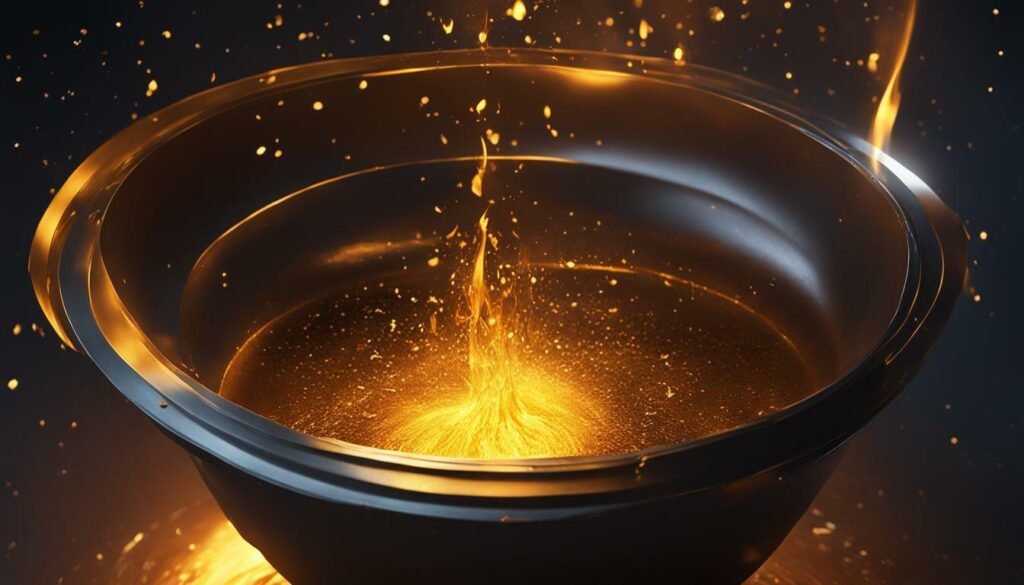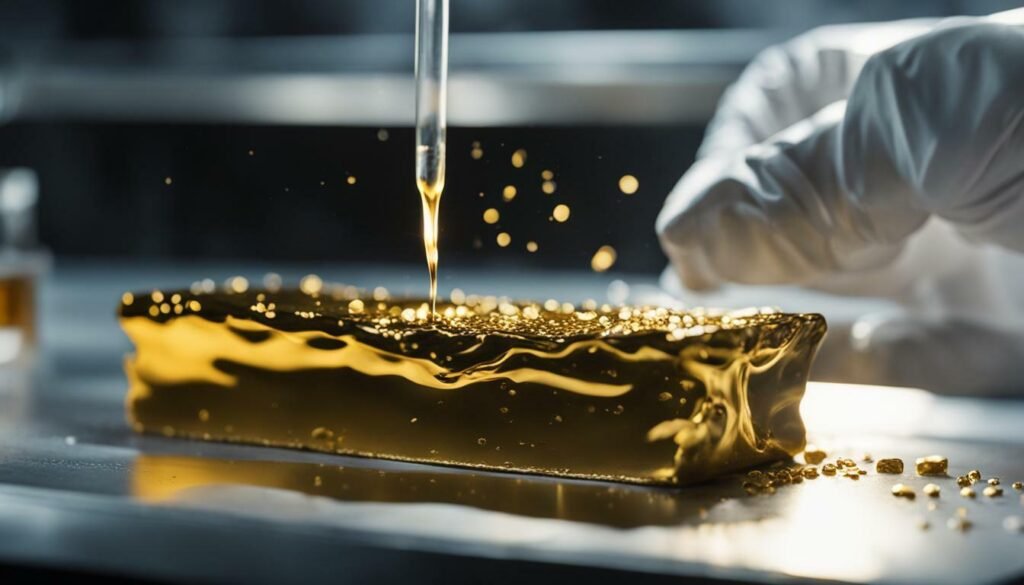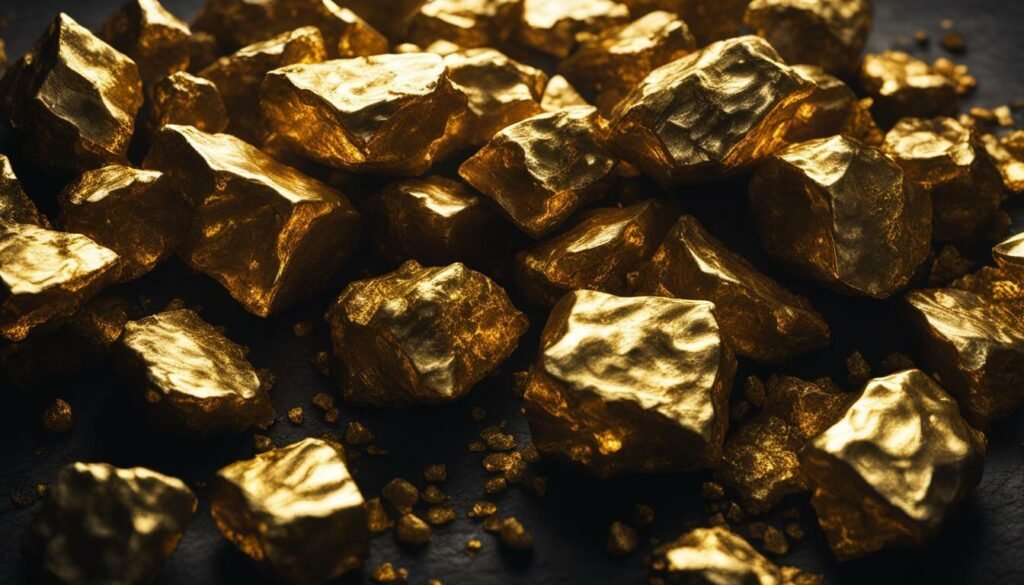Is Gold Flammable?
Gold is a cherished metal, but have you ever wondered if it is flammable?
Many people are curious about this aspect of gold and whether it can catch fire. In this article, we will delve into the properties of gold and explore whether it is indeed flammable or not.
First and foremost, it’s important to note that gold is not considered to be flammable. As one of the least reactive substances known to man, gold will not burn in air at any temperature. It may melt at high temperatures, but it will not ignite or catch fire.
Gold’s unique properties contribute to its non-flammability. It does not react with oxygen, water, acids, or bases, which makes it highly resistant to rusting or corroding. This is why gold is often used in jewelry and coins, as it maintains its shine and beauty over time. Additionally, gold is found in nature in its elemental form, further enhancing its stability.
If you’re curious about testing the authenticity of gold, various methods can help determine if it is real. These include heating with a lighter, using a magnet, conducting an acid test, or using a ceramic tile. However, for a definitive answer and assurance, it’s best to consult a professional jeweler.
It’s worth noting that gold is non-toxic and can pass through the digestive system without causing harm. This debunks any concerns or myths surrounding the ingestion of gold. However, it is important to exercise caution and take safety considerations into account when handling gold, especially when working with high temperatures or conducting tests.
In conclusion, gold is not flammable and possesses unique properties that contribute to its non-reactivity with fire. Its historical significance as a sought-after metal and store of wealth further solidifies its enduring value. So, if you’ve ever wondered if gold is flammable, now you know the answer: it’s not.
Remember to rely on professional expertise for any specific inquiries regarding gold and its properties.
Key Takeaways
🔬 Gold is non-flammable: Gold is not considered flammable as it doesn’t ignite, burn, or react with air, water, acids, or bases at any temperature. It is one of the least reactive substances known.
💍 Unique properties: Gold’s non-reactivity makes it resistant to corrosion, tarnish, and rust, maintaining its shine and value over time. Its properties make it ideal for use in jewelry, coins, and various industries.
🌡️ High melting point: Gold has a melting point of 1,064 degrees Celsius (1,947 degrees Fahrenheit). While it can melt at high temperatures, it won’t catch fire, making it valuable for applications like jewelry crafting.
🍽️ Non-toxic to humans: Gold is safe to ingest in small amounts, as it is non-toxic and passes through the digestive system without being absorbed into the bloodstream.
🛠️ Professional testing recommended: While there are various methods to test gold’s authenticity at home, consulting a professional jeweler is advised for accurate results and safe handling, especially when working with high temperatures or conducting tests.
Understanding the Properties of Gold
Gold is known for its exceptional properties that make it resistant to burning. It is one of the least reactive substances known to man and will not burn in air at any temperature. This unique characteristic of gold is attributed to its stable chemical structure and low reactivity.
Gold does not react with oxygen, water, acids, or bases, which sets it apart from many other metals. This non-reactivity contributes to its resistance to corrosion, tarnish, and rust. It also means that gold does not oxidize or undergo chemical changes when exposed to the elements.
When it comes to melting, gold has a high melting point of 1,064 degrees Celsius (1,947 degrees Fahrenheit). While gold can be melted at high temperatures, it will not catch fire. This makes it a valuable metal for various applications, such as jewelry crafting or refining processes.

In summary, gold’s exceptional properties make it a highly sought-after metal. Its non-reactive nature, resistance to burning, and high melting point contribute to its enduring value. Whether you’re considering investing in gold or simply appreciate its beauty, understanding its properties can deepen your admiration for this precious metal.
Gold in its Elemental Form
Gold is commonly found in its pure, elemental form in nature. It is one of the few metals that occur naturally without being combined with other elements. This is a testament to its stability and resistance to corrosion.
Unlike other metals that may require extensive processing or refinement, gold is easily recognizable due to its distinct yellow color and shiny appearance. It has been revered for its beauty and rarity throughout history, with civilizations around the world valuing it as a symbol of wealth and status.
The natural occurrence of gold in its elemental form has made it a sought-after material for jewelry and coins. Its intrinsic value and timeless appeal make it a popular choice for adornments, both for personal use and as investment pieces.
| Properties | Description |
|---|---|
| Symbol | Au |
| Atomic Number | 79 |
| Atomic Weight | 196.967 |
| Melting Point | 1,064 degrees Celsius |
| Boiling Point | 2,807 degrees Celsius |
Gold’s unique properties, including its resistance to oxidation and corrosion, have made it a valuable and versatile material. It is highly conductive of electricity and is used in various industries, including electronics, dentistry, and aerospace.

“Gold is a precious metal that has captivated mankind for centuries. Its occurrence in pure form in nature adds to its allure and value.”
Overall, the natural occurrence of gold in its elemental form highlights its enduring appeal and significance. Its stability and resistance to corrosion make it an ideal material for various applications, from jewelry to industrial use. As you delve further into the properties of gold, you will discover how this precious metal continues to fascinate and captivate people around the world.
Melting Gold and its Effects
Melting gold can serve to purify the metal, but it should be done with great care. Gold has a relatively low melting point of around 1,064 degrees Celsius (1,947 degrees Fahrenheit). This means that it can be melted using common tools such as a torch or furnace.
However, it is important to note that melting gold requires specialized equipment and knowledge. The high temperatures involved can be dangerous if not handled properly. Therefore, it is recommended to leave the melting of gold to professionals who have the necessary expertise to ensure safety and optimal results.
During the melting process, impurities in the gold can be removed, resulting in a purer metal. This is especially important in jewelry making and other applications where high purity is desired. However, attempting to melt gold at home without the proper equipment and experience can lead to accidents or damage to the metal itself.
It is always best to consult a professional jeweler or goldsmith when it comes to melting gold. They have the expertise and equipment to handle the process safely and accurately. By entrusting your gold to a professional, you can ensure that the metal is handled with the utmost care and that the desired purity is achieved.
Table 1: Melting Points of Common Precious Metals
| Metal | Melting Point (°C) | Melting Point (°F) |
|---|---|---|
| Gold | 1,064 | 1,947 |
| Silver | 961.8 | 1,763 |
| Platinum | 1,768.3 | 3,214 |
As seen in Table 1, gold has a lower melting point compared to platinum but a higher melting point compared to silver. Understanding the melting points of different metals is essential for various applications, including jewelry making, metalworking, and precious metal refining.

In conclusion, melting gold can be a useful process to purify the metal, but it should be done by professionals with the necessary expertise and equipment. The high temperatures involved in melting gold require caution and proper safety measures to avoid accidents. By consulting a professional jeweler or goldsmith, you can ensure that your gold is handled with care and that the desired purity is achieved.
Gold’s Non-Toxicity and Digestive System
Contrary to popular belief, gold is non-toxic and can safely pass through the digestive system. Its inert nature makes it resistant to chemical reactions, allowing it to remain unaffected by the acids and enzymes present in the stomach and intestines. This unique property has led to the use of gold in various medical applications, including the treatment of rheumatoid arthritis and other inflammatory conditions.
When ingested, gold particles are not absorbed into the bloodstream but rather pass through the digestive system and are eventually excreted. This means that consuming small amounts of gold, such as gold leaf in culinary dishes or gold-infused beverages, poses no significant health risks.
To put any concerns to rest, numerous scientific studies have confirmed the non-toxicity of gold. Research has shown that even prolonged exposure to gold nanoparticles, which are significantly smaller than a human cell, does not cause adverse effects on human health. Gold is truly a remarkable element that combines beauty and safety.

Gold’s Benefits in Alternative Medicine
Gold has been valued for its healing properties in alternative medicine for centuries. In ancient times, it was believed to possess mystical powers and was used to treat a variety of ailments, from joint pain to skin conditions. Today, gold is still used in traditional medicine systems like Ayurveda and Chinese medicine, where it is believed to promote vitality and longevity.
While the exact mechanisms behind gold’s potential health benefits are not fully understood, some studies have suggested that gold nanoparticles may possess anti-inflammatory and antioxidant properties. These properties could contribute to the positive effects observed in the treatment of conditions like rheumatoid arthritis.
However, it’s important to note that the use of gold in alternative medicine should be approached with caution. As with any form of treatment, it’s always best to consult a qualified healthcare professional before trying any alternative therapies involving gold.
Testing the Authenticity of Gold
There are several tests you can perform to determine if the gold you have is authentic. Gold’s unique properties make it resistant to burning, but there are other ways to identify its authenticity. One common test is heating the gold with a lighter or torch. Real gold will not change shape or color when heated, while fake gold may melt or discolor.
Another test involves using a magnet. Gold is not magnetic, so if your gold is attracted to a magnet, it is likely not genuine. However, keep in mind that some gold jewelry may have small magnetic components, such as clasps, so use this test with caution.
The acid test is a more reliable method and is commonly used by professionals. It involves applying nitric acid to the gold to see if it reacts. Genuine gold will not be affected by the acid, while fake gold may dissolve or show signs of discoloration.

| Test | Authentic Gold | Fake Gold |
|---|---|---|
| Heating with a lighter | No change | Melts or discolors |
| Magnet test | Not attracted | Attracted |
| Acid test | No reaction | Dissolves or discolors |
Finally, you can also use a ceramic tile to conduct a streak test. Rub the gold against the tile, and if it leaves a golden streak, it is likely genuine. If the streak is black or another color, it may be a fake gold alloy.
While these tests can provide a good initial assessment of gold authenticity, for a definitive answer, it is always recommended to consult a professional jeweler. They have the expertise and specialized equipment to accurately determine the authenticity of gold.
Consult a Professional Jeweler for Assurance
When it comes to determining the flammability of gold, it’s always best to consult a professional jeweler. These experts have in-depth knowledge and experience in assessing the properties of gold, including its resistance to burning. They can provide accurate information and answer any specific questions or concerns you may have.
A professional jeweler will have access to specialized equipment and techniques to test the authenticity and purity of gold. They can perform various tests, such as heating the gold with a lighter, using a magnet to check its magnetic properties, conducting an acid test, or using a ceramic tile for streak testing. These tests can help determine if the gold is real or if it has been mixed with other metals.
By consulting a professional jeweler, you can ensure that you are getting reliable information about gold’s flammability and other properties. They can guide you in making informed decisions when buying or selling gold jewelry or other gold items. Additionally, they can provide valuable insights into the care and maintenance of gold, ensuring its longevity and preserving its value.
| Benefits of Consulting a Professional Jeweler | Reasons to Consult a Professional Jeweler |
|---|---|
|
|
So, if you are curious about whether gold is flammable or have any other questions regarding this precious metal, it is recommended to consult a professional jeweler. They can provide the assurance and expertise you need to make informed decisions about gold-related matters. Remember, gold is not considered flammable, but for precise information, it is best to seek guidance from a professional in the field.

Despite popular beliefs, gold is not susceptible to catching fire, but there are some common myths surrounding its flammability. Let’s take a closer look at these misconceptions and separate fact from fiction.
Myth 1: Gold can burn and turn into ashes.
This is not true. Gold has an extremely high melting point of 1,064 degrees Celsius (1,947 degrees Fahrenheit), but it will not burn or turn into ashes like combustible materials. Instead, gold will melt when exposed to high temperatures, which can be used to purify the metal. However, it does not undergo combustion or produce flames.
Myth 2: Gold jewelry can catch fire.
Gold jewelry is highly unlikely to catch fire under normal circumstances. Gold is a non-reactive metal, which means it does not oxidize or corrode when exposed to oxygen, acids, or water. Its stability and resistance to heat make it a popular choice for jewelry, as it can withstand everyday wear and tear without the risk of flammability.
Myth 3: Heating gold with a lighter can determine its authenticity.
While heating gold with a lighter is sometimes suggested as a test for authenticity, it is not a reliable method. Gold is an excellent conductor of heat, and it will quickly absorb and dissipate the heat from a lighter flame. To accurately determine the authenticity of gold, it is best to consult a professional jeweler who can perform specific tests using specialized equipment and expertise.
| Myth | Fact |
|---|---|
| Gold can burn and turn into ashes. | Gold has a high melting point but does not burn or turn into ashes. |
| Gold jewelry can catch fire. | Gold jewelry is highly unlikely to catch fire due to its non-reactive nature. |
| Heating gold with a lighter can determine its authenticity. | Heating gold with a lighter is not a reliable method for authenticity testing. |
Remember, gold is a precious metal known for its durability, non-reactivity, and resistance to flammability. If you have any concerns or questions about gold’s properties, it is always recommended to seek advice from a professional jeweler who can provide accurate information and assistance.

When handling gold, it is important to prioritize safety to avoid any accidents or mishaps. While gold is a valuable and precious metal, it is essential to handle it with care due to its unique properties and potential risks involved.
Maintain a Clean and Controlled Environment: Create a dedicated workspace free from clutter and distractions. This will help minimize the risk of accidental damage or loss of gold items. It is also advisable to work in a well-ventilated area to prevent the buildup of any potentially harmful fumes.
Protective Equipment: Wear appropriate protective equipment when working with gold, especially when using tools or machinery that may pose hazards. Safety goggles, gloves, and protective clothing can help shield you from any potential injuries or chemical reactions.
Handle with Care: Gold is a soft metal that can be easily scratched or dented. When handling gold items, be gentle and avoid any rough contact that could cause damage. Use soft, non-abrasive materials to clean and polish gold surfaces.
Emergency Procedures
In the event of an accident or emergency while handling gold, it is crucial to be prepared and know the appropriate actions to take. Here are some essential emergency procedures to keep in mind:
- If a chemical spill occurs, immediately remove any contaminated clothing and rinse the affected area with water for at least 15 minutes. Seek medical attention if necessary.
- If a fire breaks out, use a fire extinguisher suitable for extinguishing metal fires, such as a Class D fire extinguisher. Follow the instructions provided by the manufacturer and evacuate the area if the fire cannot be controlled.
- If you accidentally ingest or inhale gold particles, seek medical assistance immediately. Provide information about the incident and follow any advice given by medical professionals.
By following these safety considerations when handling gold, you can ensure a safe and enjoyable experience while working with this precious metal. Remember to always exercise caution, seek professional guidance when needed, and prioritize your well-being above all else.

Gold has held great historical significance, being treasured by various civilizations throughout time. Its allure and rarity have made it a symbol of wealth, power, and prestige. From ancient Egypt to the Roman Empire, gold has played a central role in shaping human history.
One of the earliest known uses of gold dates back to around 4000 BC, when it was highly valued by the ancient Egyptians. They believed that gold was the skin of their sun god Ra and considered it a divine metal. Gold became a symbol of eternal life and was used to adorn the tombs of pharaohs.
“Gold has a tremendous psychological fascination for people.”
The Romans, known for their opulence and grandeur, also revered gold. They used it to create intricate jewelry, coins, and decorative items. Gold coins, such as the aureus, were used as a form of currency and a way to display wealth. The Roman Empire’s fascination with gold continued throughout its reign.

During the 19th century, the discovery of gold in California sparked a mass migration known as the Gold Rush. Prospectors from all over the world flocked to the region in search of fortune. The newfound wealth transformed California’s economy and played a significant role in the development of the United States.
Today, gold continues to hold its value and remains a sought-after precious metal. It is used not only in jewelry but also in various industries, including electronics and dentistry. The allure of gold’s historical significance, combined with its timeless beauty, ensures that it will always be treasured and admired.
| Key Points |
|---|
| Gold has held great historical significance, symbolizing wealth and prestige. |
| Ancient civilizations, such as the Egyptians and Romans, revered gold. |
| The Gold Rush in the 19th century had a profound impact on California. |
| Gold remains a valuable and cherished precious metal today. |
Conclusion
In conclusion, gold is not flammable and possesses unique properties that make it resistant to burning. As one of the least reactive substances known to man, gold will not burn in air at any temperature. This is due to its non-reactivity with oxygen, water, acids, and bases, as well as its low reactivity compared to other substances. Therefore, you can rest assured that your gold jewelry and coins are safe from catching fire.
Gold is often found in nature in its elemental form, without being combined with other elements. This natural occurrence contributes to its stability and resistance to burning. While gold may melt at high temperatures, it does not ignite or burn. However, it is important to note that melting gold should be left to professionals due to the high temperatures involved and the need for specialized equipment and techniques.
Furthermore, gold is non-toxic and can pass through the digestive system without causing harm. This means that if you accidentally ingest a small amount of gold, there is no need to worry. Gold is chemically inert and does not react with the acids and enzymes in our digestive system.
If you have doubts about the authenticity of your gold, there are various tests that can help determine if it is real. These tests include heating the gold with a lighter, using a magnet to check for magnetic attraction, conducting an acid test, or using a ceramic tile to observe the color and streak of the gold. However, for a definitive answer and expert advice, it is recommended to consult a professional jeweler.
Remember, gold is a precious metal with a long history of use and value. Its resistance to burning, non-toxicity, and durability make it an ideal choice for jewelry and investment. If you have any further inquiries about gold’s characteristics, always consult a professional for accurate information and guidance.
FAQ About Is Gold Flammable
Is gold flammable?
No, gold is not considered to be flammable as it is one of the least reactive substances known to man and will not burn in air at any temperature.
What are the properties of gold that make it non-flammable?
Gold does not react with oxygen, water, acids, or bases, and it does not rust. Its low reactivity and resistance to these elements contribute to its non-flammable nature.
Can gold melt? Does it catch fire when melted?
Gold can melt at high temperatures, but it will not catch fire. Melting gold can actually purify it, but it is important to exercise caution when working with high temperatures.
Is gold toxic if ingested?
No, gold is non-toxic and can pass through the digestive system without causing harm. However, it is not recommended to ingest gold as a regular practice.
How can I determine if gold is real?
Various tests can be conducted to determine the authenticity of gold. These include heating with a lighter, using a magnet, conducting an acid test, or using a ceramic tile. However, for a definitive answer, it is recommended to consult a professional jeweler.








